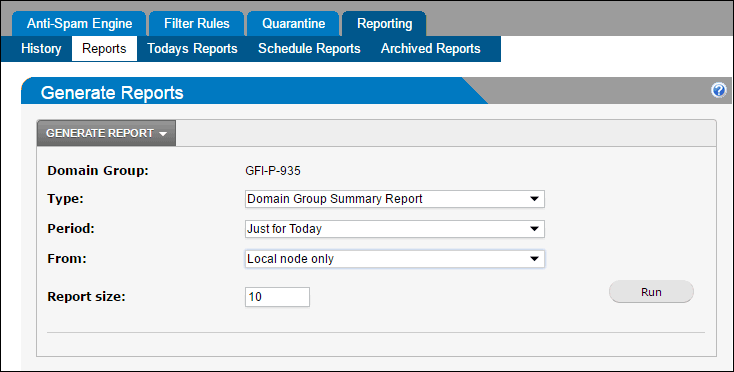Generating reports
The Reporting > Reports page allows you to generate a number of on-demand reports.

Generating reports
The following table describes the options available when generating on-demand reports:
| Field | Description |
|---|---|
| Type |
Select the type of report to generate. The report types groups the information that includes overview of mail usage, top spam and viruses recipients . |
| Period |
Choose the period for which the report is generated. Options available are:
Note that a report period of All generates a report based on all the records in the database. As records can be automatically purged, this may not include all records since subscribing to GFI MailSecurity. |
| From |
Choose the option that matches the scope of report. The options are: Local node only: Restricted to the server from where the report is been generated. Cluster: Include the entire cluster. |
| Report Size |
Indicates the number of items to include in the report. This value is only relevant for top-ten type reports. Note that the pie chart is limited to a maximum of 25 items. |
Click Run to start generating the report.
Go to Reporting > Today's Report to access all the on-demand reports that were requested today. The latest report is displayed on top. Click View to see the report data.
The following actions can be performed on generated reports:
| Option | Description |
|---|---|
| View |
Click to view your generated report. The displayed information depends on the type of report selected. Some reports display in the form of a table and some display as a pie chart. |
| Generate PDF Report |
Generate and download a PDF version of the report. |
| Download to Spreadsheet |
Generate and download a Microsoft Excel spreadsheet version of the report. |
| Delete |
Delete the selected report. Note that deleted reports are not recoverable. |
| Archive |
Generated reports are automatically purged on a daily basis. To save the report for longer, then you can archive it by clicking Archive. The Archive is accessible from Reporting > Archived Reports tab. For more information refer to Archived Reports. |